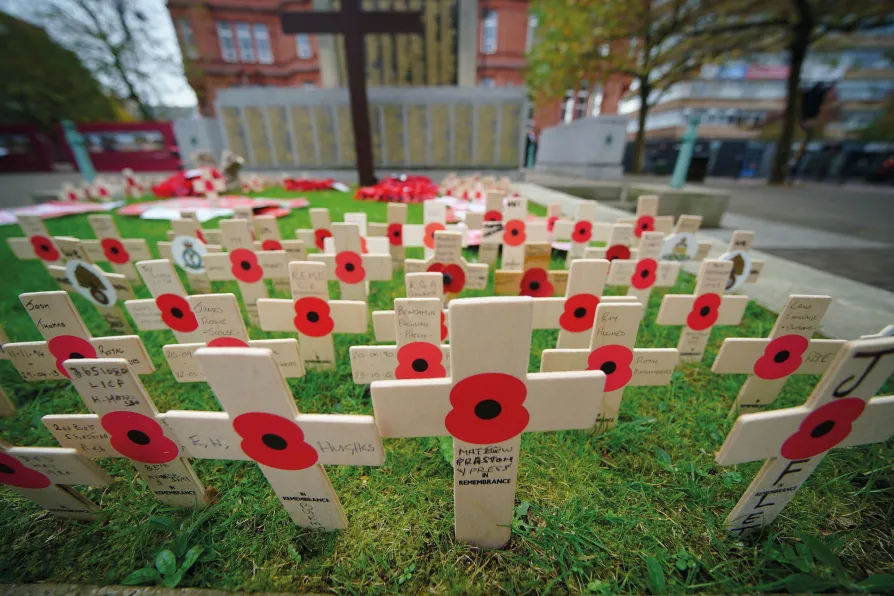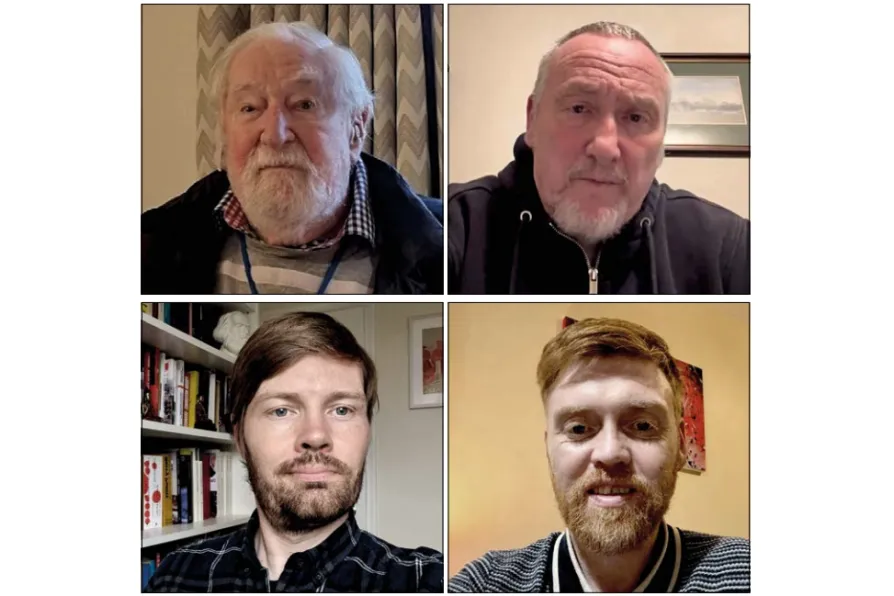Does widespread and uncontrolled use of AI change our relationship with scientific meaning? Or with each other? ask ROX MIDDLETON, LIAM SHAW and MIRIAM GAUNTLETT
WILL DRY speaks to three former members of the armed forces about the political hypocrisy surrounding Armistice Day, how war is a function of class society, and the far right’s use of militarism and nationalism to divide working people

 RITUALS: Wooden crosses with poppies and names of those being remembered at the Cenotaph in Victoria Square, St Helens, Merseyside
RITUALS: Wooden crosses with poppies and names of those being remembered at the Cenotaph in Victoria Square, St Helens, Merseyside
THIS past Sunday, like every November, we saw Britain’s ruling Establishment drape themselves in solemn ritual, with wreaths laid, heads bowed, poppies pinned.
At the same time, fuelling the very wars that make Remembrance necessary. The ceremonies grow more elaborate as the meaning grows hollow.

For Britain’s communists, remembrance has never been about glorifying war, empire or nationalism. It is, and must remain, a warning from history: that working people were sent to slaughter in imperialist wars not of their making. We honour those who took up arms to defeat fascism, but we also recognise that the greatest tribute to the fallen is to confront the forces that make war inevitable, nationalism, imperialism, and fascism, and fight for lasting peace.
This year, as war rages in Gaza and Ukraine, as Sudan bleeds for its valuable minerals, and as the world edges closer to global war, I spoke with three other veterans, all members of the Communist Party of Britain, about what remembrance truly means to us as socialists who have served in Britain’s armed forces.
“I was in the second world war, in the navy, from 1942 to 1945,” recalls David Grove, who served on a destroyer in the north Atlantic and later on motor torpedo boats in the North Sea. A party member for more than 80 years, he joined the CP while still a student at Oxford before he ever went to sea.
“My four best friends were killed in the war,” he says quietly. “So, I have a very personal approach to remembrance. I always think of them and what a loss they were to me and to all their friends.”
Even before the war, he was uneasy about the tone of official commemorations.
“I’ve always been unhappy that remembrance is seen in a military light rather than a peace light,” he says. “The general attitude is that we are remembering those who made the ultimate sacrifice for their country, and that this is the finest thing you can do, that it will be your turn one day. I’ve always found that troubling.”
For David, remembrance must be about human loss and the fight for peace, not national pride. “War is a function of class society,” he adds. “The politicians who bow their heads at the Cenotaph while stoking new conflicts are hypocrites; they seem happier talking about war than about peaceful ends.”
Steve Handforth served as a captain in the 2nd Battalion of the Royal Regiment of Fusiliers from 1989 to 1993, with postings in Norway and Northern Ireland.
“The armed forces were my class education,” he says. “You form close bonds and lifelong friendships, but as a working-class officer you’re never really part of the ruling-class club. That’s made very clear from day one.”
Steve says he joined with sincere ideals. “Like many who serve, I genuinely believed in peacekeeping, freedom, and democracy,” he explains. “But over the years I saw casual racism, white supremacism, and the use of our forces to fight illegal wars of aggression in the name of spurious causes.”
He reserves particular contempt for those who twist remembrance into nationalism. “It disgusts me to see the crassness of right-wing chauvinism around poppies,” he says. “People who quote Wilfred Owen while dishonouring everything he stood for.”
Politicians fare little better. “They’ve encouraged this vulgarisation for ever more illegal wars over resources, as imperialism and capitalism go deeper into crisis,” he continues. “And they’ve supported a vile genocide in Gaza, something they will never wash the stain from. As far as I’m concerned, they’re excommunicated from remembrance.”
David agrees and doesn’t hold back when asked for his views on the leading figures of the political Establishment attending remembrance events: “It’s quite despicable, isn’t it really. These hypocrites are stirring up war fever again. The appalling thing is that they enjoy doing it. A lot of these politicians seem much happier when they’re talking about war than talking about peaceful ends.”
Phil Cosgrove joined the Royal Navy at 16, serving as a sonar operator. “My experience was both sides of a coin,” he says. “You travel the world, then suddenly you’re thrust into a war zone. When men and women started coming home in body bags, it made me question everything.”
He says seeing US and British forces dominate conflicts under the banner of the “war on terror” opened his eyes to the realities of imperialism. “You realise who profits, the arms dealers and oil giants,” he explains. “Many young people had little choice but to join the military.”
For many in working-class communities suffering the deprivations of British capitalism, the system gives them no other options. It has been this way for generations.
Phil believes the far right’s misuse of national symbols is a deliberate tactic to divide the working class. “They’ve tried to commandeer the flag to stir up racial tension,” he says. “But veterans know what those symbols should mean — pride, solidarity, unity — not hate.”
He also condemns the politicians who attend remembrance services while authorising new wars. “It sickens me,” he says, “that politicians attend these events as it is them who give the orders to go to war so find it quite hypocritical.”
From a Marxist perspective, the veterans agree that remembrance cannot be separated from the class realities of war. David explains it plainly: “The first world war, which finished shortly before I was born, was a straightforward imperialist war. Britain was the top dog in the imperialist game, and Germany wanted to catch up. That was of course the origin of the first world war and also the origin of the second world war, a continuation of that with the Nazi aggression. But the second world war was more complicated.”
For David, like many who fought, that conflict had a distinct class character. He explains: “They made the mistake of invading the Soviet Union and once the Soviets were involved and the alliance had been formed then the character of the war changed, because we could guarantee that it was a genuine anti-fascist war. And so, like many others, I was happy to fight in it. I hated war, and had, like many people in the 1930s been influenced by passivist views. But by 1942, I was quite clear that this was an anti-fascist war which had to be fought and won.”
Veterans like us see a clear line between those past conflicts and the crises of today, as David explains: “We’ve always had war as war is a function of class society.”
Phil agrees: “As Marx said, wars are fought for the economic interests of the ruling class.” How can remembrance be reclaimed from nationalism and militarism?
David believes it begins with the peace movement: “I’m glad that groups like CND are organising alternative acts of remembrance. It’s difficult, when everyone’s wearing the red poppy and assuming everyone agrees, but it’s an opportunity to approach the whole business differently, to remember the fallen while fighting for peace.”
He also notes that official ceremonies seem less widely observed today than in the past and that perhaps this reflects an increasing public disenchantment with its more miliary and nationalist character, and that this presents us with an opportunity to approach it in a different way. An emphasis on peace that might resonate with more people and less on alienating nationalism and militarism.
Phil calls for pride on the left: “Trade unions, anti-racist groups — they’re making their voices heard again.” He is under no illusion that reclaiming remembrance will take time, but it’s part of the same fight against division and for peace class solidarity.
For Steve, the task is clear: “As British Marxists, I believe we should honour those who fought against fascism and who died in the trenches, and all those who suffered from wars of imperialism. But we must commit to make sure that those wars are put in the dustbin of history for all time.”
For veterans who are also socialists, remembrance is not a flag-waving exercise, nor should it sanctify war. It is a call to conscience. To honour the dead is to fight for the living: against militarism, against imperialism, and for peace and socialism in our time.
The poppy should remind us of the horrific human cost of war, not serve as a banner for those preparing the next one. We will remember them. Not to sanctify war, but to end it.
Will Dry is a Communist Party member and former corporal in the British Army’s Royal Logistics Corps.

MAT COWARD tells the extraordinary story of the second world war Spitfire pilot who became Britain’s most famous Stalag escaper, was awarded an MBE, mentored a generation of radio writers and co-founded a hardline Marxist-Leninist party

Speaking to a CND meeting in Cambridge this week, SIMON BRIGNELL traced how the alliance’s anti-communist machinery broke unions, diverted vital funds from public services, and turned workers into cannon fodder for profit

As Britain marks 80 years since defeating fascism, it finds itself in a proxy war against Russia over Ukraine — DANIEL POWELL examines Churchill’s secret plan to attack our Soviet allies in 1945 and traces how Nato expansion, a Western-backed coup and neo-nazi activism contributed to todays' devastating conflict

On the 80th anniversary of liberation from Nazi-fascism, left forces in Italy mobilise against genocide, armament, and the Meloni government, reports ANA VRACAR









